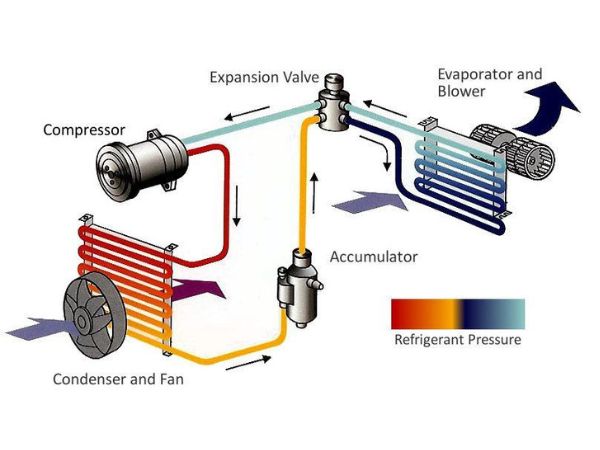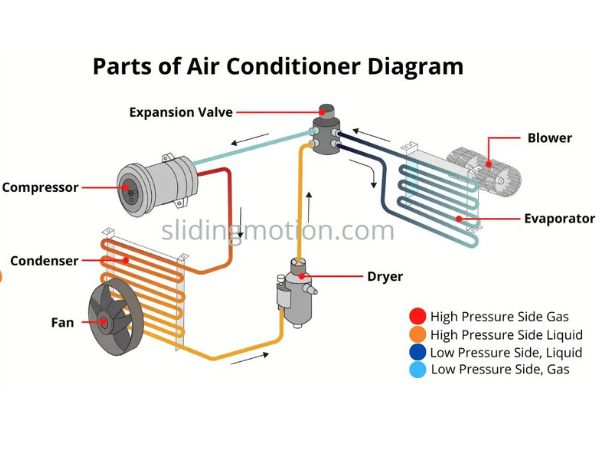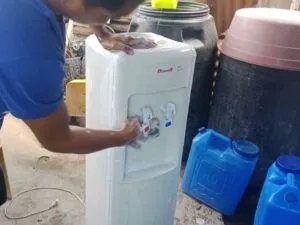What Are The Parts In An Air Conditioner?

Air conditioners have become an integral part of our lives, providing comfort and respite from hot and humid weather. To truly understand how these cooling machines work, it’s essential to familiarize ourselves with their various components and their functions. In this article we will walk through What Are The Parts In An Air Conditioner?
Contents
- 1 The Basic Components
- 2 The Refrigerant
- 3 Air Handling System
- 4 Electrical Components
- 5 Cooling Coils
- 6 Fans and Motors
- 7 Drainage System
- 8 Heat Exchangers
- 9 Filters and Purifiers
- 10 Thermostats and Controls
- 11 Noise Reduction Features
- 12 Safety Features
- 13 Energy Efficiency Features
- 14 Maintenance and Upkeep
- 15 Troubleshooting and Common Issues
- 16 Upgrades and Add-Ons
- 17 Environmental Impact
- 18 Choosing the Right Air Conditioner
- 19 Conclusion (What Are The Parts In An Air Conditioner)
- 20 FAQs
The Basic Components
The primary components of an air conditioner include the compressor, condenser, evaporator, and expansion valve. Each of these parts plays a crucial role in the cooling process, working together to create a comfortable indoor environment.
The Refrigerant
The refrigerant is a vital substance that circulates throughout the air conditioning system. It absorbs heat from indoor air, transfers it to the outdoor unit, and releases it outside. Common types of refrigerants include R-410A and R-22, and they are essential for the cooling process.
Auto Amazon Links: No products found. No products found. http_request_failed: A valid URL was not provided. URL: https://ws-na.amazon-adsystem.com/widgets/q?SearchIndex=All&multipageStart=0&multipageCount=20&Operation=GetResults&Keywords=What+Are+The+Parts+In+An+Air+Conditioner%3F|Home+appliances|Galaxy+s23|SAMSUNG+Galaxy+S23+Ultra+5G|SAMSUNG+Galaxy+S23+Ultra+Cell+Phone&InstanceId=0&TemplateId=MobileSearchResults&ServiceVersion=20070822&MarketPlace=US Cache: AAL_d185252e7dbec8c69b5a42d4126d6183
Air Handling System
The air handling system consists of the air filter, blower fan, and ductwork. The air filter removes dust and particles from the incoming air, while the blower fan circulates conditioned air throughout the space. Ductwork ensures proper airflow and distribution.

Electrical Components
Several electrical components are integral to the operation of an air conditioner. The thermostat controls the temperature, while the capacitor provides the necessary electrical energy for the compressor and motors. Relays, contactors, and the circuit board enable electrical connections and control functions.
Cooling Coils
Cooling coils are responsible for absorbing heat from the indoor air. They come in different types, such as evaporator coils and condenser coils. The construction typically involves fins and tubes to increase surface area for efficient heat transfer. Regular cleaning and maintenance of the coils are crucial for optimal performance.
Fans and Motors
Air conditioners have two main fans: the condenser fan, which expels heat from the outdoor unit, and the evaporator fan, which circulates conditioned air indoors. These fans rely on motor-driven mechanisms to function effectively and ensure proper airflow.
Drainage System

The drainage system is responsible for removing condensate, the moisture generated during the cooling process. It consists of a condensate drain pan and a drain line. Proper drainage is crucial to prevent water damage and maintain the system’s efficiency.
Heat Exchangers
Heat exchangers facilitate the transfer of heat between the air and the refrigerant. The air-to-air heat exchanger balances the temperature between the indoor and outdoor air, while the air-to-refrigerant heat exchanger allows heat absorption or release during the cooling process.
Auto Amazon Links: No products found. No products found. http_request_failed: A valid URL was not provided. URL: https://ws-na.amazon-adsystem.com/widgets/q?SearchIndex=All&multipageStart=0&multipageCount=20&Operation=GetResults&Keywords=SAMSUNG+Galaxy+S23+Ultra+5G|SAMSUNG+Galaxy+S23+Ultra+Cell+Phone|What+are+the+main+parts+used+in+AC%3F|Galaxy+s23|What+are+the+4+main+parts+of+an+AC%3F&InstanceId=0&TemplateId=MobileSearchResults&ServiceVersion=20070822&MarketPlace=US Cache: AAL_6b5f5941e02077e3ebc15d9a07755efa
Filters and Purifiers
Air filters play a vital role in maintaining indoor air quality by trapping dust, allergens, and pollutants. Additionally, air purifiers can be integrated into the system to further enhance air quality by eliminating harmful contaminants.
Thermostats and Controls
Thermostats allow users to set and control the desired temperature. Different types of thermostats, including programmable and smart thermostats, offer advanced features and energy-saving capabilities, providing greater convenience and efficiency.
Noise Reduction Features
To minimize noise levels during operation, air conditioners often incorporate sound insulation materials and vibration dampening technologies. These features help create a quieter and more comfortable environment.

Safety Features
Air conditioners are equipped with safety mechanisms such as overload protection and high-pressure/low-pressure switches. These features help prevent system damage, improve safety, and ensure optimal performance.
Energy Efficiency Features
Energy efficiency is a significant consideration in air conditioners. The SEER (Seasonal Energy Efficiency Ratio) rating indicates the unit’s efficiency, while variable speed technology adjusts the compressor and fan speeds to match the cooling requirements, resulting in energy savings.
Maintenance and Upkeep
Regular cleaning, filter replacement, and professional maintenance checks are essential for the longevity and efficiency of an air conditioner. Proper maintenance helps prevent breakdowns, ensures optimal performance, and improves indoor air quality.
Troubleshooting and Common Issues
Air conditioners may encounter common issues such as refrigerant leaks, airflow problems, or electrical malfunctions. Understanding these issues and implementing simple troubleshooting tips can help address minor problems without the need for professional assistance.
Upgrades and Add-Ons

For enhanced functionality, air conditioners can be upgraded with additional features. Zoning systems enable personalized temperature control in different areas, while air purifiers and dehumidifiers improve indoor air quality.
Environmental Impact
Air conditioners have an environmental impact due to refrigerant emissions and energy consumption. Choosing units with lower global warming potential and reducing energy usage can help minimize their carbon footprint.
Choosing the Right Air Conditioner
When selecting an air conditioner, factors such as cooling capacity, energy efficiency, and specific requirements of the space must be considered. Consulting professionals and getting the right-sized unit ensures optimal performance and energy efficiency.
Conclusion (What Are The Parts In An Air Conditioner)
Understanding the various parts of an air conditioner is crucial for troubleshooting, maintenance, and choosing the right unit for your needs. Regular maintenance, professional assistance, and energy-efficient practices contribute to a comfortable and sustainable cooling experience.
FAQs
What is the most important component of an air conditioner?
The compressor is often considered the most important component of an air conditioner as it circulates and compresses the refrigerant, enabling the cooling process to take place.
How often should I clean or replace the air filters?
Air filters should ideally be cleaned or replaced every 1 to 3 months, depending on usage and the level of dust or contaminants in your environment. Regular maintenance helps maintain airflow and prevent clogging.
Can I use any type of refrigerant in my air conditioner?
No, it’s important to use the specific refrigerant recommended by the manufacturer for your air conditioner. Different units are designed to work with specific refrigerants, and using the wrong type can damage the system and affect its performance.
What should I do if my air conditioner is making strange noises?
Strange noises from your air conditioner may indicate a mechanical issue. It’s best to turn off the unit and contact a professional technician to diagnose and resolve the problem. Ignoring unusual sounds can lead to further damage.








